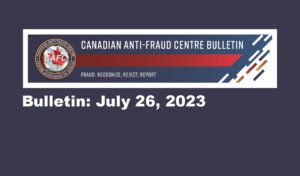Bulletin: Social Media Messages Asking For Help
2023-07-26
The Canadian Anti-Fraud Centre is receiving reports of fraudsters using compromised social media accounts to ask for a favour. Fraudsters will claim that they are trying to setup a new cellphone and they require a code or ask to click on a link in order to finish the setup process. If the victim provides the code or clicks on the link, their social media, and potentially their device gets compromised.
Once the victim’s social media account or device is compromised, messages are sent to their contacts asking for the same favor. Based on reports received, clicking on the malicious link can also lead to bank account takeovers or other forms of identity fraud.
Warning Signs – How to protect yourself
- If you receive a message on social media, email, text message or a phone call asking for a favour, contact the person directly by using a different method of communication (phone number you have in your contact list).
- Never click on links from unsolicited messages.
- If you receive a request to provide a code, it is very likely that is part of the dual authentication process to access your account. Never provide the requested code!
- Remember that simply clicking on a link can potentially infect your cellphone or device and put you at risk for identity fraud.
- If you are asked to provide a code to someone, remember that their account could be compromised. If the code is provided, you are potentially giving them access to your account.
- If you believe that your device has been compromised, contact a licensed technician.
- If your personal information has been compromised, follow these steps to protect yourself.
Anyone who suspects they have been the victim of cybercrime or fraud should report it to their local police and to the Canadian Anti-Fraud Centre’s online reporting system or by phone at 1-888-495-8501. If not a victim, you should still report the incident to the CAFC.




